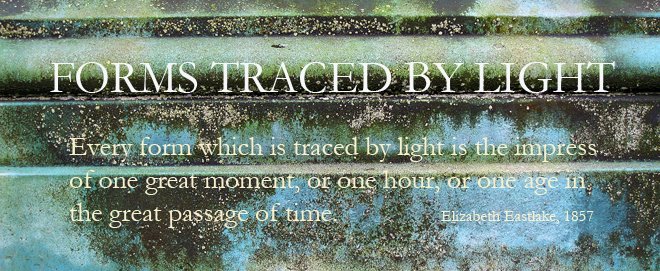It's got to the stage of the semester when I forget the most basic things, like one of the books we're going to discuss in class (no damage done: I had a pdf of the relevant chapter), and my cell phone (not much damage done there, either, surrounded as one is by other electronic devices). It's a highly suitable peacock feather cell phone cover, of course ...
Forgetfulness goes along with age, to be sure, and I was made to feel very very old indeed today. This wasn't just because 3 of the 6 students in class (a graduate course under the aegis of English, "Victorian Visual Culture and its Afterlives") claimed not to have heard the word/term "Pre-Raphaelite" before taking this course, but because I read through as many reviews as I could find of the recent big PR show that was up first at the Tate, and then in DC. I thought that Roberta Smith's sneering review in the NYT was the quintessence of miscomprehending snideness until I encountered the full panoply of the British press. One major objection seemed to be over-familiarity - "Pre-Raphaelite art is so familiar it forms part of our national collective DNA," claimed Alastair Smart in the Telegraph's magazine, "With its sickly bright colours, lack of perspective, visual overload and faux-chivalric scenes of medieval romancing, it's a Marmite moment that some love, I myself loathe, but everyone has an opinion on." Laura Cumming, in the Observer, was more critical of the style, "the deadening pre-Raphaelite effect. The characteristics are always the same: glistening excess, lurid colour, that all-over emphasis and oppressive density of detail that leaves the eye with nowhere to go, that demands your obedient attention. This is an art that insists on telling you where to look, what to think and how to feel - that wants to turn you into a passive Burne-Jone zombie." Jonathan Jones, in the Guardian, called the show a steam-punk triumph, a raw and rollicking resurrection of the attitudes, ideas and passions of our engineering, imperialist, capitalist and novel-writing ancestors ... The Victorians are back in town. This is as much a costume drama as a show, jam-packed with heroes and villains and innocent victims, holding up a lurid mirror to the age that built Britain." Maybe it's that equation with Britishness that's the problem. Certainly, this seems to be the message that Dinah Roe conveys in her blog "Pre-Raphaelites in the City:" "When I recently tweeted the question 'Why do people hate the Pre-Raphaelites?', the first reply I received was: 'Because Andrew Lloyd Webber likes them.' This is Pre-Raphaelitism's problem (and the new exhibition's) in a nutshell. How can Pre-Raphaelitisim challenge its image as an insular, conservative, retrogressive, stereotypically 'Victorian' movement which appeals solely to the like of Andrew Lloyd Webber, Margaret Thatcher and 'Disgusted of Tunbridge Wells.'"
By claiming the PRs as avant-garde, as this exhibition did, indeed ... And so, we can discuss "what is avant-garde"? ... But what I felt today went so much deeper. The Pre-Raphs are, in a sense, in my own DNA - that is, I can't really remember not knowing about their existence (if that sounds improbable, it's because they used to come and stay with George Howard at Naworth, the castle where we rented a tower to live in when I was small, in the north of Cumberland, and there was a Burne-Jones frieze over the fireplace in the Long Gallery, and BJ windows in the local parish church, and so on ...). And once I went to the Tate regularly, they became familiar friends, and I had Millais's Autumn Leaves as a poster on my wall in my first undergraduate room. I still have a postcard of it on my office noticeboard, by my desk - in a sense that escapes words, that image is me. And of course, all of this stops me getting any objective distance on the Pre-Raphs - not in an intellectual sense, since I can find all kinds of things interesting and perplexing about them, but in a visceral one. But today, for the first time, I felt that my taste - in the sense of an intimate self-recognition with an art work - might be something distinctly generational, and passé. And that, indeed, made me feel old.



No comments:
Post a Comment